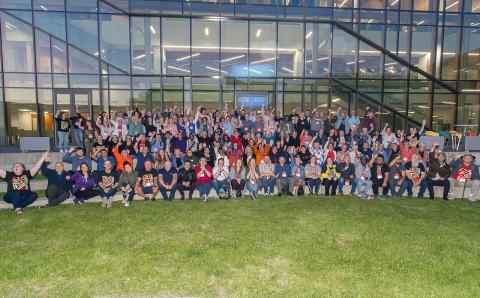“Experiment” is a good word, said Corey Van Huizen, pastor of Redeemer Online Church, in a July 18 interview with The Banner. It “affords you a kind of latitude for making mistakes, being on the frontier, the edges.” There’s a messiness inherent in experimenting that Van Huizen compared to the early church. He’s reaching people who are not otherwise being discipled. And that “missional” edge is one of the reasons Synod 2025, the annual general assembly of the Christian Reformed Church, encouraged continued experimentation when it received the Virtual Church Task Force report in June.
Van Huizen is one of three pastors working in online spaces who contributed to the report, which was requested by Synod 2023 after synod was asked to “declare that a virtual church is not a church.”
In three years Redeemer Online, which operates in partnership with parent church Redeemer CRC in Sarnia, Ont., has grown to over 6,000 followers and subscribers from 89 different countries. They access livestreams, teaching videos, liturgies and daily devotions through digital video and photo-sharing platforms YouTube, Instagram, and TikTok. Some reach out to Van Huizen for one-on-one discipleship and pastoral care through video calls, messages, or emails.
Synod encouraged the calling churches of digital church plants, along with the classis (regional group of churches), “to pray for, partner with, and offer intentional support for church planters who are navigating the unique challenges of digital ministry.” It also instructed churches “to provide a clear ministry plan to their classis, including especially how they plan to fulfill the marks of the true church in their context and how they plan to address the importance of embodiment and in-person gatherings.” Van Huizen said he supplied a ministry plan to Classis Ontario Southwest when he first applied for funding and he annually attends classis in person to share statistics and stories.
While synod encouraged, when applicable, to move virtual church participants “toward gathering as a hybrid or in-person church,” Van Huizen, who planted an in-person church before launching Redeemer Online, doesn’t think this should be universal. He said he initially wanted to see in-person groups form, similar to what might be labeled “small groups” in a typical congregation. But “the reality is when you decentralize control like this, it's very hard to control what things look like.” While some of Redeemer Online’s followers do meet in person, for example “in a pub on a Wednesday night or in a lady’s living room on a Sunday morning,” Van Huizen says he no longer tries to push that. He’s found that some people connected to Redeemer Online are those who, for good reasons, cannot attend a brick-and-mortar church—like a 50-year-old British man who “wants to grow as a follower of Jesus, but literally cannot leave his house” because of a panic disorder, or a New York marketing professional who deconstructed her faith a decade earlier, after her brother, a gay man, was rejected by his church.
“I don't want to make Mr. Parker, who is trapped inside his room, feel like a second-class citizen,” said Van Huizen, suggesting that mandatory in-person attendance would be “an anxious requirement.” In-person church and virtual church seek the same thing, and it’s not just attendance: “The goal of our faith is more love, more joy, more peace, more patience, more kindness.”
Synod encouraged those experimenting with digital ministry to share learning with each other and continue discerning together “the legitimacy of virtual churches including especially how they might fulfill the marks of the true church in their context.” The marks of the church, articulated in the Belgic Confession, one of the CRC’s Three Reformed Standards, are “pure preaching of the gospel … pure administration of the sacraments as Christ instituted them … (and) practic(ing) church discipline for correcting faults.” Van Huizen thinks the confession “is not restrictive” on how those would be demonstrated. “Ten a.m. on Sunday mornings in a beige brick building with a maroon carpet is not the norm by any stretch in the church globally. The question (I asked) the task force is, ‘if we can throw it all back on the table, what would be other effective, efficient ways to preach the gospel, do discipleship, and have people experience the tangible grace of God?’”
Synod 2025 directed the Office of General Secretary to work with denominational agencies to be a resource to classes and churches that are considering how best to support virtual-church church experiments. Van Huizen recognizes there is “a lot of anxiety” around the idea of virtual church, which he thinks is understandable. But if lessons can be learned from virtual church’s in-person counterparts, the task force reporting to synod also acknowledged it goes in the other direction, too: “We have much to learn from people who are on this missional edge in our denomination” (Agenda for Synod 2025, p. 320).
About the Author
Maia VanderMeer is a freelance news correspondent for The Banner. She lives in Mission, B.C.









